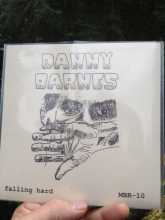"Falling Hard's banjo intro is classic Barnes, excelling into what's now known as Barnyard Electronics. A jagged tale of the working class over an Earl Scruggs riff layered with industrial rhythms and Bronx scratching." Bryant Liggett, DJ and GM for KDUR in durango CO.
News
minner bucket records labelmate and i, matt sircely, are currently doing a four day run of shows in the great northwest. we played olympia last night where we used my old shure vocal master PA! sold out of all the tapes we brought. tonight we play up in glacier, and then port townsend, and we finish on sunday down in portland at mississippi studios. the barnjo 15000 is the weapon of choice on this run.
we got an email from the PD over at KDUR, one of the great independant radio stations in the country, over in durango colorado, they just played the A side to the new single, falling hard. thank you!!!

Vinyl came back – can tapes be next?
Danny Barnes, revered punk rock banjo player for Nineties locals the Bad Livers, loves cassettes. From his now longtime home in Seattle, he gets downright evangelical about his Minner Bucket Records putting out "handmade experimental music" on cassette. Like many who grew up in the Seventies, he was surrounded by tapes.
"My point of reference is a mixtape. I grew up getting 'em, making 'em, trading 'em."
He preaches the cassette gospel, embracing their practicality ("If you're a punk band in Galveston and you know you're gonna sell 25 copies of something, you can do a lot better making a tape really low-budget, then give away the download"), their place in music history ("The mixtape was the lingua franca of the punk rock weirdo"), and aesthetics ("Electric guitars on a cassette recorded really hot is one of the coolest sounds ever!")
Cassettes were once the most common prerecorded music format alongside vinyl. Their sales peaked in the Eighties after Sony introduced the Walkman, then tapered off as CDs obliterated all other musical formats through the Nineties. Barnes sees the first truly portable music format as a still-revolutionary medium for DIY music. He's not alone.
Local record stores are expanding their stock of new-release cassettes. One independent buzz label of the moment, L.A.'s Burger Records, was built on the back of cassettes. And don't look now, but September 7 marks the inaugural Cassette Store Day, celebrating all things cassette with special releases, etc.
Stop shaking your head. You humored Record Store Day right? It helps account for vinyl comprising 35% of all music sold in the first quarter of 2013.
- - - -
View rest of the story at the Austin Chronicle >> http://www.austinchronicle.com/music/2013-08-30/the-return-of-the-cassette/

it's new music from the lab! side A is a brand new song called falling hard. [here is a link to a live recording as it premiered at northwest string summit 2013, with darol anger, drew emmitt, and larry and jenny keel: link to the archive.]
the B side is a song called money moves up, which is a lyrical idea i got from watching a noam chomsky lecture. it's a hard luck banjo song with a sample of these trucks going by that i dug up.
the records are on multi-colored vinyl, all swirly and each one is slightly different. the cover image was drawn by minner bucket records labelmate stripmall ballads.
you can order the record here.
WFHB in bloomington indiana was the first station to play falling hard, i hand delivered it when i played at the venue across the street there on 7.25.13. the track is in spinitron now so you should be able to request the song from any weirdo [good] dj.
1. First of all, could you tell us a bit about yourself, and what it is that you do?
i'm a songwriter/musician/performer/engineer.
2. Many people have claimed that there is no longer any money in record sales, and that touring is the most efficient way to earn an income as a band. How much truth do you think there is in this sentiment?
personally i don't think there is any truth to it. those kind of macro statements are pretty difficult to prove, and where the work is actually getting done, from where i sit, the result would be that an artist or entity will have to find their own way. to say that no one can make money off records and everyone will have to make money off of touring is an invalid statement. it depends on the artist, time in question, and various other factors. in other words, if you directly copy someone else's business model, odds are you will probably go broke.
3. Which alternatives for musicians to earn money through record sales seem most promising and will prevail in the future?
i don't have any answer for that. to me, it boils down to ideas. i'm interested in ideas. it seems to me that the world would be benefitted if musicians would just get busy making things and stop trying to predict the future like that. try it and see, if it doesn't work, try something else.
4. What do you think about DIY (do-it-youself) practices, such as fan-funding?
i'm all for DIY, but it's so cheap to do stuff, why bother someone else with that?
5. What benefits and/or disadvantages have arisen from this distribution method? Would you say this method is a realistic possibility for the future of music distribution?
i don't think anything has really risen that is going to solve any of these issues you bring up. folks are trying different stuff and that's cool, that's what creative folks are supposed to do, take creative approaches to things. i think the best response an artist can have is to make the best music they can make.
6. What would be your preferred medium to listen to music (eg. Vinyl, CD, tape, MP3 etc.), and why?
well i'm a big believer in use. what is something designed for? [in sort of a swedenborgian sense]. if i'm trying to carry 1000 songs with me in as small a place as possible i'm going with mp3. my preferred method is cassette because that's my particular frame of reference. i'm a vinyl fan as well. if you listen to a poor idea on a great sounding format, that isn't going to help you very much. if i listen to a fantastic song made on a warbly four track, for some reason, it still sounds fantastic! which leads me to believe that the crux of the biscuit is the idea, and not the trappings.
7. Much has been made of the supposed death of the record store in recent years. Do you believe the digital age has killed the record store, and if so, do you think that this is a necessary part of progression, or a tragic loss?
i don't really have emotion about it one way or the other. there are some great record stores out there and they seem to be always packed so…there you go. i don't think anything has killed anything. i'm finding all kinds of great new music on vinyl and tape. just like when i was 14. i'm 50 now. so, in a sense, nothing has changed.
8. Do you feel that the abundance of recorded music that is easily available on the internet has led people to place more importance on the live experience as the ‘authentic’ way to hear music?
no i don't. i suppose i'm a bit of a post-structuralist in that it would depend on whom you asked. i don't really think these macro trends "mean" anything other than the simple function they serve. if there is an abundance of easily available recorded music, that just means there is an abundance of easily available recorded music. a=a.
9. In your opinion, to what extent should copyright be enforced? Do you believe that downloading and sharing music, as well as remixing it for non commercial purposes should be illegal?
that's a really good question and i don't know the answer.
i would like to hope that the system will morph to help encourage folks to come up with things. but i wouldn't expect that to happen in a macro sense. i know i have devoted my whole work life basically to making up ideas, researching and developing ideas. i know it takes a long long time for an idea to economically compensate the creator. i know i have seen others take ideas i have developed and make lots of money on them. but i suppose i'm too busy making my next batch of ideas to get to worked up about all that one way or the other.
10. Do you feel the idea of an album, as a piece of art that people will listen to from start to finish, has been undermined or forgotten about in the digital age?
no i don't. principally because myself and my friends and most anyone that i can think of that is smart or interesting, seems to view records in the complete state. so i don't see this undermining and forgetting as being any reality that i can relate to.
11. How has the internet affected what you do? Would you say it’s made your job easier, or more difficult?
well to me it's just just a medium. like if the post office suddenly started coming to your house on a laser motorcycle seventy times a day, you still have to write the letter. you still have to make good ideas and find good ideas. so i would say, things are pretty much exactly the same as they have always been, we still have to work to find good stuff. one thing that is different, is there is an incredible proliferation of mediocre or half-baked concepts that must be waded through. that's new. but it's still about as hard as ever to find the really good music/ideas. and also, the Mechanism has perfected the art of promoting stupidity as a lifestyle, so that is a quite formidable adversary in terms of good/useful/interesting ideas, but creative people always find creative answers, that's what they are here for.
there's been quite a lot written about the superiority of wave files vs. mp3. there exists a certain collective wisdom bandied about in regard to how great waves are and how terrible mp3s are. here are some things to consider about this comparison.
first off, i grew up listening to 45s, and am radios. my first radio [and i want to get another one of these] was a tiny little transistor that i carried about with me and kept glued to my ear. i believe i was about six. if i remember correctly, it came from a garage sale, and was in a tiny little leather case. am only. and i remember how thrilling it was when a song i liked would come on. at night i could tune in [at that point i lived up in vernon texas where it was very flat and in the middle of the country roughly speaking] and get this amazing "skip" whereby i could catch stations from all over the country. i would lie awake under the covers and listen. the first vinyl record i ever had, i got at a harvest festival or fall festival at the elementary school or something where you pay a quarter and you have a fake fishing pole and someone from behind the curtain puts a little gift on there. i got a 45 of etta james singing you got it, and i need it. strangely it had no b side, if i remember correctly, it was the same cut on both sides. i listened to them both. it was a well worn copy. and my player was a little portable mono table top unit made by ge. the point here is that i suppose in a sense, a contemporary ipod is a higher quality audio playback device than what i had in my initial stages of development. yet, the power of the music as i heard it [and i still consume music in those formats] was enough to launch me on a lifetime commitment to exploring the joys of music. the rudimentary playback system was not an impediment to musical enjoyment.
within reason, the quality of the playback device just isn't that big of a deal. i remember back in the day, there were these hi-fi nerds that would have these big systems and could spout the specs of various units. they typically didn't really care for music as much as they just liked have something expensive that could be lorded over others. 5000 dollars worth of audio gear and four records.
i was paying pretty close attention to music all through the late sixties, seventies, eighties, nineties, and the naughts, and here's something to consider: the music is the thing, not the format so much. people love to make lots of opinions about things they can easily count or quantify. [wether or not a song is any good is hard for folks to quantify, what format it is on, and how many copies it has sold is much easier because there is an assigned number to regurgitate.] people also tend to repeat little opinions [they have heard others say] about things as though it were a proven fact and a big deal.
consider this: it would be possible for me to set up a blind test, of a wave file vs. and mp3 that 99% of the population would not be able to pass. perhaps 100% why? because just because something is a wave doesn't mean it was well recorded. and just because it's an mp3 doesn't mean it necessarily sounds defective. it's very simple.
the way i look at it, formats are like tools. a 9mm socket is really good for certain things. however, it's not good for everything. formats have different uses. my main juke is vinyl and cassette. however, i can get a zillion songs in my ipod and carry that on the plane at a very advantageous power to weight ratio. so what? much like the fact that basically speaking, all music exists for me to enjoy at once in the great database of all that exists [fred van eps to architecture in helsinki], i have various formats at my disposal to take advantage of. what a great time to be a music fan. i'm sorry, none of this killed the music industry or ruined anything.
example: of course that prius isn't going to "run." it's designed to get gas mileage. [i use the word run in the southern hot rod slang meaning to go quickly enough to be a threat at the drag strip.] however, trying to drive that big block v8 to la is going to cost a fortune. things are designed according to use. also, the designer typically wants the use to be fairly obvious, so in verbally stating the use, it's not like you've found another moon orbiting jupiter or something. it's a small leap to say, yes mp3s are a compressed format. but they are really cheap to make and easy to email and they don't take up much space. before they were around folks dreamt of them, and now that they are common, folks complain.
how does the format sound? well it depends. there are quite a few musical styles that make great use of that format [check out alva noto]. certainly if you invest in a decent pair of headphones, that will greatly up the quality.
remember, the point is the music itself. to me, the format is like the shirt the artist has on or the day of the week they were born on. who cares? if i find a piece of music that adds meaning to my life, i'll take it in any format i can get my hands on, and then transfer it to whatever i need. easy.
i've heard so many folks phrase that statement as though every wave sounded better than every mp3 and it's simply not so. it depends.





